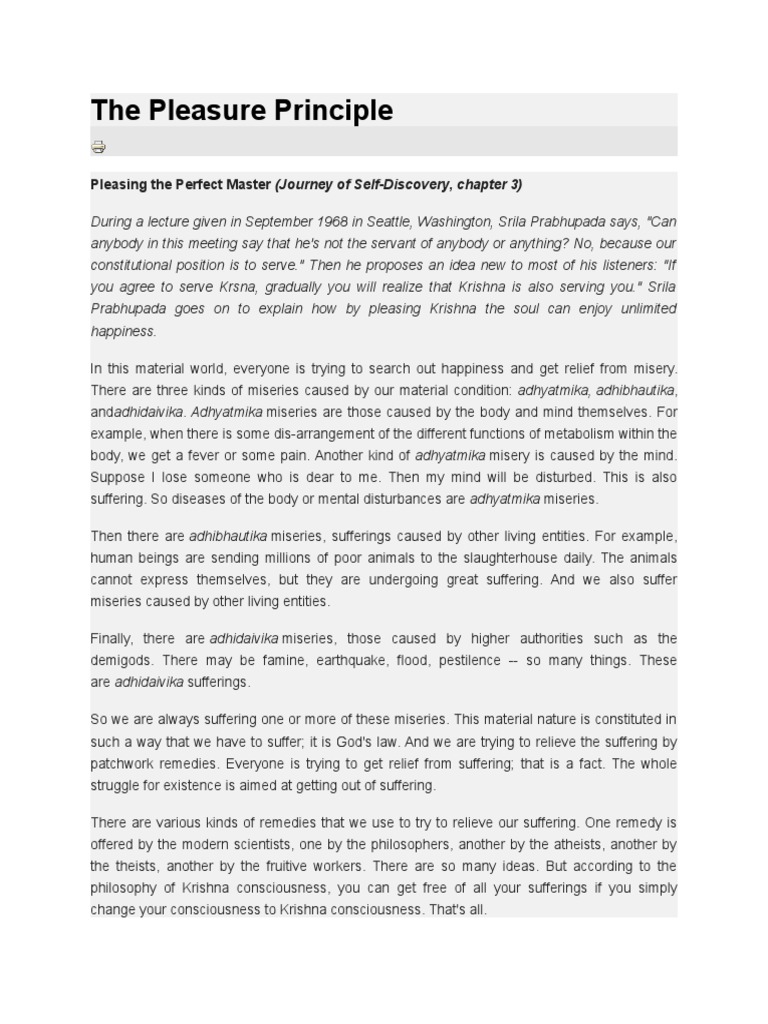In the exploration of Bahai teachings, a profound emphasis is placed upon the spiritual laws that govern human existence. Central to these teachings is the interplay between the spiritual and material realms, particularly through the lens of the Pleasure Principle. This concept transcends mere hedonism, offering a nuanced understanding of pleasure that aligns with spiritual advancement and the holistic development of the individual.
At the heart of Bahai discourse is the belief that humanity is on a collective journey towards a unified vision of peace, justice, and enlightenment. This aspiration necessitates a re-evaluation of what constitutes true pleasure. The Pleasure Principle, when viewed through the Bahá’í lens, encourages adherents to seek joy in the service of others and the cultivation of virtues rather than the fleeting satisfactions rooted in material indulgence. Thus, an essential starting point is recognizing that pleasure should not only be personal but extend to the wellbeing of society.
Understanding pleasure from this multifaceted perspective introduces us to the interplay of spiritual laws that govern our actions and intentions. Within Bahá’í teachings, one finds the principle of “consultation,” an empowering process where individuals contribute their insights and experiences. This collaborative discourse not only fosters a sense of community but also engenders a deeper understanding of each other’s needs—transforming personal pleasure into a collective experience of fulfillment.
The concept of spiritual evolution is also paramount in Bahá’í philosophy. Each individual is seen as a potential reflection of divine attributes. Pleasure, in this context, arises not merely from satisfying personal desires but from the alignment with spiritual virtues such as kindness, justice, and compassion. When individuals engage authentically in their quest for spiritual development, they often report a profound sense of joy that transcends the ephemeral nature of physical pleasures. By focusing on the cultivation of the soul, individuals can shift their perspectives; they witness a metamorphosis where inner joy becomes paramount.
Moreover, the Bahá’í Teachings posit that spirituality can be harmoniously integrated with daily life, facilitating a holistic approach to existence. This integration invites adherents to redefine pleasure as an experience intertwined with purpose. In practical terms, this manifests as involvement in community service, which not only aligns with personal satisfaction but also serves the greater good. The act of selflessness becomes a source of genuine pleasure, aligning individual desires with the broader aspirations of society.
One might then ponder how these teachings could influence interpersonal relationships. Genuine connections form a foundation for sharing and experiencing joy. According to Bahá’í principles, relationships should be nurtured by respect and understanding, which cultivates an environment where individuals can flourish. When personal pleasures are derived from the health and happiness of others, a feedback loop of joy is created, enriching all parties involved. This communal sense of fulfillment stands in stark contrast to the often isolating pursuit of mundane pleasures.
Moreover, the articulation of spiritual laws emphasizes the importance of balance. The Bahá’í writings advocate for moderation in all things, which serves as a remarkable counterpoint to contemporary society’s tendency towards excess. The moderation principle encourages individuals to experience pleasure while remaining steadfast in their commitments to spiritual growth. This equilibrium fosters a clarity of purpose—where contentment is derived from a synergistic relationship with one’s surroundings, nurturing both individual and collective advancement.
Delving deeper into the implications of the Pleasure Principle within the context of Bahá’í teachings, we encounter assertions of progressive revelation. The philosophy asserts that the truths revealed by various prophets throughout history build upon one another. Understanding this philosophy signifies an acknowledgment that pleasures of the past, informed by spiritual laws, can enrich current perspectives. Present and historical experiences of pleasure can alike offer insights into collective humanity’s aspirations for peace and harmony.
Such reflections nurture the appetite for knowledge and growth. Spiritual development, while deeply personal, is enriched by collective striving—a notion that invites curiosity. This curiosity propels individuals towards exploration of spiritual laws that extend beyond the immediate context, bridging divides and fostering understanding across cultures. As Bahá’ís embrace their responsibilities towards personal and communal betterment, they encounter a world teeming with possibilities. Each pursuit of pleasure, framed within these teachings, becomes a transformative experience.
Furthermore, as societal structures evolve, so does the understanding of pleasure and its implications for communal harmony. Just as the Bahá’í Faith emphasizes the importance of unity, the spiritual interpretation of pleasure promotes a global consciousness. Growing awareness of transnational challenges reinforces the idea that pleasure derived from compassionate action fosters international solidarity. In this light, aligning personal pleasure with global welfare becomes more than a philosophical tenet; it is an urgent call to action, bridging gaps and transforming potential discord into a harmonious symphony of collective engagement.
Ultimately, the synthesis of Bahá’í teachings and the Pleasure Principle engenders a revolutionary shift in perspective. This framework invites individuals to reevaluate their understanding of pleasure, urging a transformation that prioritizes spiritual fulfillment over ephemeral delights. By positing pleasure as a collective endeavor rooted in service, moderation, and spiritual evolution, Bahá’í teachings resonate as vital guides within contemporary society. Indeed, the journey through these principles not only piques curiosity but also invites a deepened commitment to the greater good—an indelible legacy flourishing across generations.
